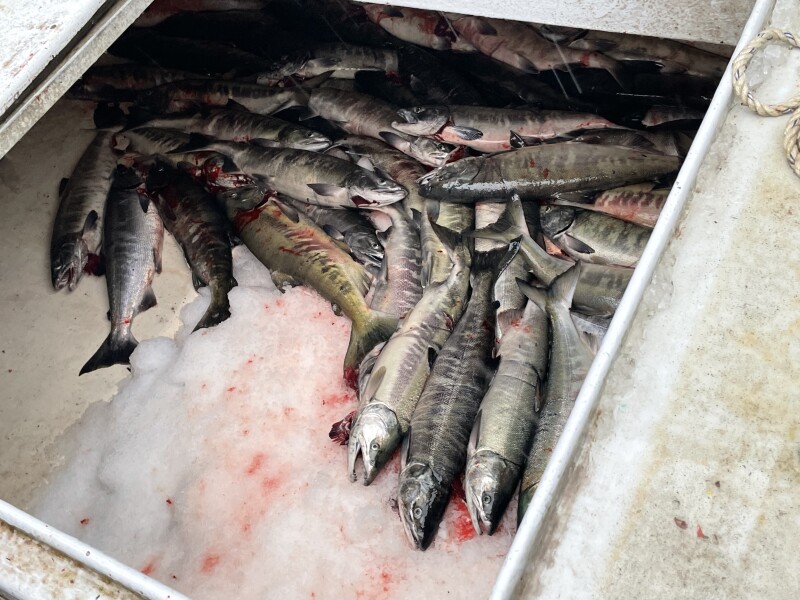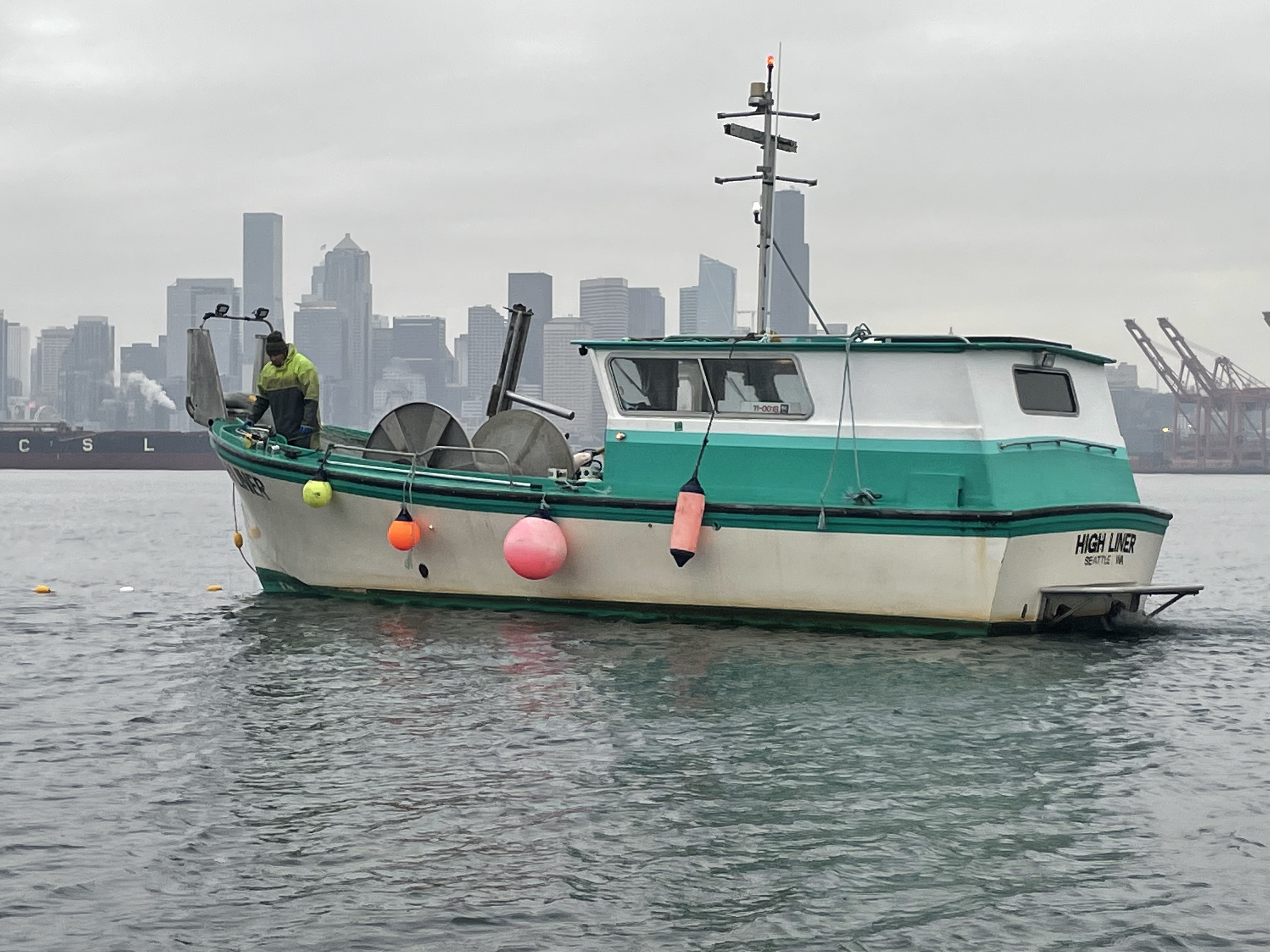Muckleshoot tribal fisherman pursue chum salmon along the heavily industrialized Duwamish River
Clouds blanket Puget Sound and the rain starts at dawn. “Do you have oil gear?” Leeroy Courville asks as we sit in the wheelhouse of his boat, the High Liner.
“Just this Red Ledge.”
Leeroy laughs and digs out some Grundens gear for me. It’s a good thing too, because the rain starts to beat down.
The High Liner lies tied to the Muckleshoot tribal dock in a heavily industrialized stretch of the Duwamish River. A pair of 454 Mercruiser gas engines power the 32-foot by 11-foot bow picker, but one is broken down. Nonetheless, one is enough to get us out to Elliot Bay, where Courville hopes to gillnet a few more chum salmon before the Tribe closes the season.
“This could be the last day,” he says. “I might just make one set and come in. But if I get 40 fish, I’ll make another set. A hundred fish is $2,000.”
Leeroy bought the boat from his father. “I had that one over there,” he says pointing at a nearby bowpicker. “I sold it and my father gave me this one. I just bought that gray bowpicker over there for my kids.”
Leeroy’s son Kobe arrives with a skiff, and I get into the open boat with him to follow his father out to the fishing grounds. “Only people from the Muckleshoot Tribe can go on our boats,” Leeroy has informed me. The Muckleshoot are among the tribes whose ancestral fishing rights were recognized by the 1974 Boldt decision, a federal court ruling that upheld Washington tribes' treaty fishing rights.
“My father was fishing before that,” Leeroy says. “And he has some stories.”
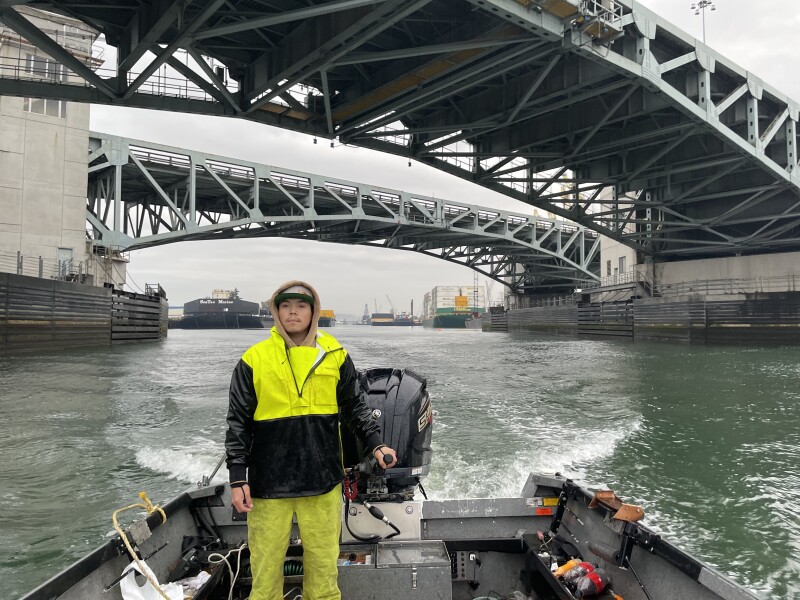
These days members of the Muckleshoot community live an hour’s drive from the dock, and they execute their fisheries in the midst of a busy port. Barges laden with aggregates and other cargoes navigate around tribal gillnetters setting their nets in the river and bay.
On the way out, Kobe points to nets stretching out from shore between the ships and barges moored along the banks of the Duwamish. “We negotiate with the Port of Seattle,” Kobe says. “If they (vessel operators) have to move a net for a ship or something, it’s $350 every time.”
The Muckleshoot nets in the river cannot exceed 300 feet. “In the bay it’s 1200 feet,” says Kobe. “But I don’t know if my father has all of that. He tore up part of his net earlier.”
We wait and watch close by as Leeroy maneuvers for his set. He’s watching another Muckleshoot fisherman set out. “He wants to see what direction he’s setting in,” says Kobe.
Once he sees the direction of the net trailing out as the nearby bowpicker sets, Leeroy runs into a corner of the bay near the mouth of the Duwamish and throws his end buoy over. “Not a lot of people fish here. Sometimes tide will take the net over into that can,” he says, referring to the channel marker. But he’s done this many times before. “When I was about 15 and my brother was 12, my father put us in a bowpicker and said, okay, back her up. That’s how you set the net.”
With just his starboard engine, steering from a station near the bow, Leeroy backs the High Liner up and lets the net roll off the big freewheeling reel amidships. Every 200 feet or so he snaps on a green or orange buoy so that tugs and ships can see his net. With the net deployed he idles the engine and lays on the end of the net as we come alongside in the skiff.
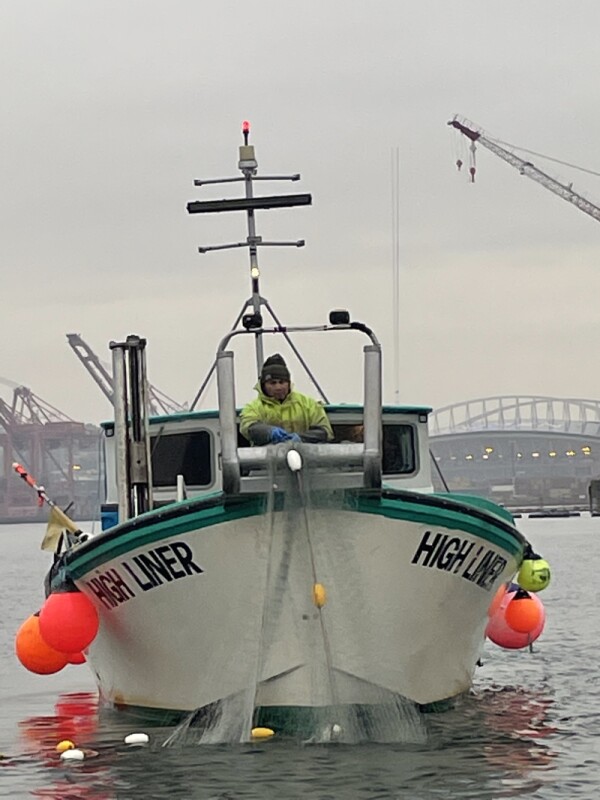
A tug comes out of the river heading for the net. “Come on you can see those buoys, can’t you?” Leeroy says, and the tug starts to turn as if they heard him in the wheelhouse. Another big barge maneuvers between the two Muckleshoot boats to makes its way into the river, with the downtown Seattle skyline and its iconic Space Needle in the background.
While almost imperceptible to the average observer crossing a bridge over the river or viewing the bay from the city, the Tribal fisheries have priority. In the midst of big-league economic activity, the Muckleshoot fishermen with their little boats land thousands of dollars’ worth of fish and keep their culture alive.
“The Tribe buys them,” says Leeroy. “I’m not sure where they sell them.” Courville takes plenty home to his family too. “I like the kings,” he says. “I cut them up and get them vacuum packed and freeze them so I can enjoy them later.”
As Leeroy and Kobe watch the net, a salmon periodically bumps the web and breaks the surface looking for an escape that does not exist. When fish hit the net it attracts harbor seals. Leeroy points to one near the net. “They just eat the bellies, the eggs,” says Leeroy. “We take what’s left home to eat. Can’t sell it.”
Watching the seal, he goes into the wheelhouse and emerges with what looks like a big firecracker, the fuse already lit and burning. “We have these seal bombs,” he says, and tosses it overboard. It goes off underwater - boom! We can feel the small explosion in the hull of the skiff. We drift along, Leeroy throws another bomb and finally makes the call to start the haul back. Kobe jumps aboard to help.
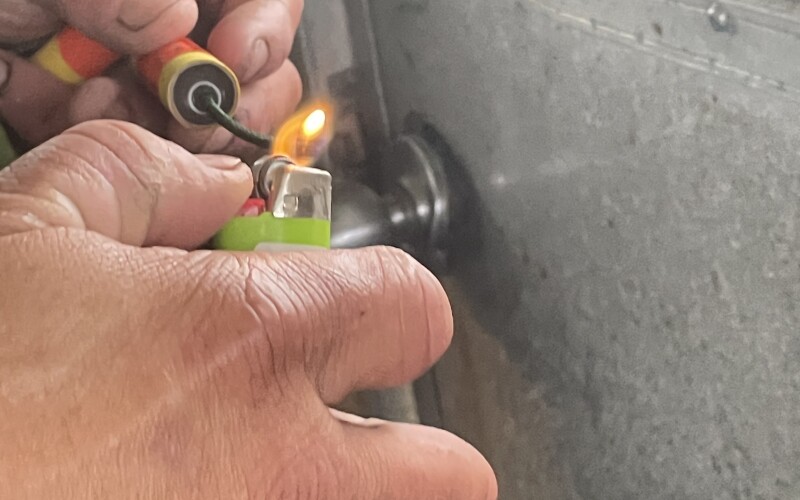
The gillnet has 6-inch mesh and drops 180 meshes from the cork to the lead line. Leeroy sets up the net guide that will spool it evenly onto the reel and starts to haul. Fish come steadily, keeping father and son busy picking.
They easily untangle the sleek females, but the big males ready for spawning have developed big snaggletoothed jaws that sometime grab the web in ways that slow down the picking. One unlucky one comes aboard hanging by a single tooth. “They’re getting dark,” says Leeroy of the fishes’ color. “It’s late” in the time for them to head upriver.
Fish caught deep in the net require Leeroy and Kobe to rapidly gather up the web to reach the fish. “Digging down the web, we call it,” says Leeroy, and they do it with impressive speed. Once they get a fish out they deftly rip its gills to bleed it, and toss it onto a bed of ice in the hold. The boat could carry 12,000 pounds, Leeroy estimates, but he has never put that many aboard. “Three or four hundred fish is a good day,” he says. “I shovel a bed of ice into the hold, then I have a box on deck, and I shovel ice on top the fish.”
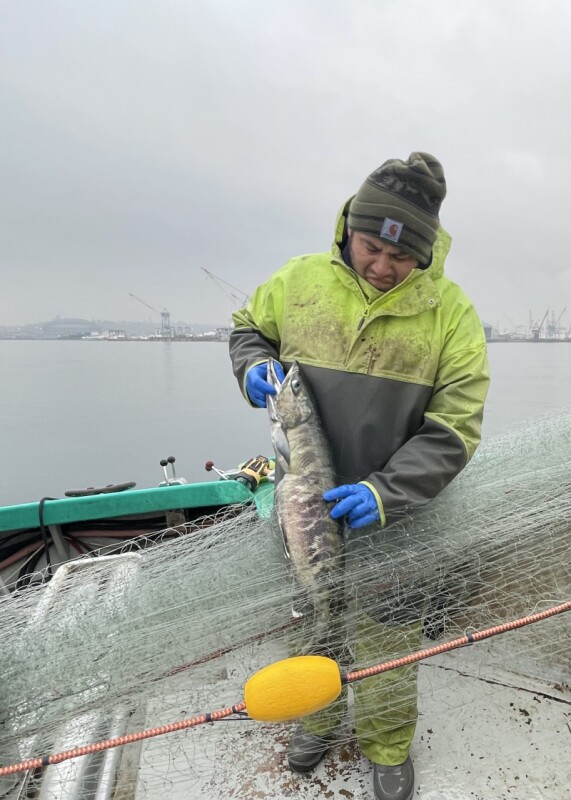
The fish pile up - Leeroy gets his 40, or near to it. “I’m going to make another set, what are you going to do?” He asks Kobe.
“I’m goin’ in,” Kobe says.
He gets back into the skiff, and starts the 250-hp Yamaha Vmax, a jet outboard. “We use this in the Puyallup river a lot,” he says. “There’s a lot of rocks and shallow water.” He opens up the throttle, eager to get home, apparently, and we tear up the Duwamish at faster miles an hour, who knows? Fast through the driving rain that hits us like needles.
“I usually fish this boat. He usually fishes alone,” Kobe says of his father. While the non-Native fleet - average age 56 - wrestles with the graying of the fleet, the Muckleshoot don’t have that problem; both Kobe, 21, and his 18-year-old sister, Paige, fish commercially.
“They’ve gone with me,” Leeroy had explained earlier. “But they make more money on their own, so I don’t blame them.” The elder Courville notes that it has been an exceptional year.
“We’ve done really well,” he says. “We started fishing kings in the Duwamish in August, and then moved to Lake Union. Then we fished Lake Washington up until about three weeks ago. Now we’re over here.” Courville adds that the prices have also been exceptional. “When you see $2 a pound for chum, you have to fish,” he says. “For coho we got $3.25, and $6 for kings. The Tribe’s been generous this year, paying a little more.”
Leeroy stays out on the bay and finishes the day with 280 fish, he informs me later, crediting the tribal hatchery. “Urban sprawl and development have impacted the runs,” he says. “But the Muckleshoot tribe has invested a lot of money in our hatchery. So, we’re able to get good numbers of fish in one of the most challenging environments in Washington.”
Back at the dock, Kobe takes me to another bowpicker. “This is our boat too,” he says. “We just bought it. You can leave the rain gear in there.”
“Tell your father thanks for the loan. I’d be in the hospital with hypothermia right now without it,” I tell him. The rain pours down on gray steel bridges, cranes and industrial grime, a scene out of some urban apocalyptic movie.
In spite of it all the Muckleshoot practice a fishery as they have done since before history. One can’t help but wonder, when this economy disappears as all things do, if the salmon and the Muckleshoot will still be here.
